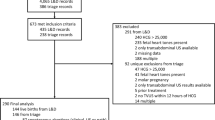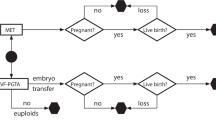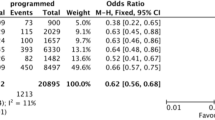Abstract
Background
Chromosomal microarray analysis (CMA) has been widely applied to explore the genetic etiology in recurrent pregnancy loss (RPL). However, the reproductive prognosis in RPL couples with different types of chromosomally abnormal miscarriage remains unclear.
Objectives
The main purpose of this study was to evaluate the reproductive prognosis among RPL couples after genetic testing in products of conception (POCs) by CMA.
Study design
In this retrospective study, 1101 RPL couples referred for genetic testing in POCs by CMA. A total of 830 couples who met the inclusion criteria were followed up for at least 24 months after the index miscarriage. The rates of live birth and adverse pregnancy events in subsequent pregnancy and cumulative pregnancies were examined.
Results
For couples with three or more miscarriage, compared with those with chromosomally normal miscarriage, a significantly higher subsequent live birth rate was found in couples with chromosomally abnormal miscarriage (66.9% vs 71.6%, P = .040). However, differences in cumulative live birth rate among couples with chromosomally abnormal miscarriage and normal miscarriage were nonsignificant (82.7% vs 80.2%, P = .131). Women with advanced maternal age showed a significant decrease in the live birth rate (P < 0.01) and an increase in the miscarriage rate (P < 0.01) than those aged < 35 years old, regardless of whether the miscarriage was chromosomally normal or abnormal. RPL couples with chromosomally normal miscarriage showed a significant decrease in live birth rates in subsequent pregnancy and cumulative pregnancies, when they had experienced a large number of previous miscarriages; however, no significant difference was observed in those with chromosomally abnormal miscarriage.
Conclusion
For women with three or more previous miscarriages, RPL couples with chromosomally normal miscarriage manifested a poorer reproductive prognosis than those with chromosomally abnormal miscarriage in subsequent pregnancy, while the cumulative live birth rate was similar. Advanced maternal age was a predictor of adverse pregnancy events, regardless of embryonic chromosomal results. Furthermore, among RPL women with large numbers of previous miscarriages, the supportive care and counselling regarding individual risk is necessary for those with chromosomally normal miscarriage.


Similar content being viewed by others
References
Practice Committee of the American Society for Reproductive Medicine. Evaluation and treatment of recurrent pregnancy loss: a committee opinion. Fertil Steril. 2012;98(5):1103–11. https://doi.org/10.1016/j.fertnstert.2012.06.048.
Practice Committee of the American Society for Reproductive Medicine. Definitions of infertility and recurrent pregnancy loss: a committee opinion. Fertil Steril. 2020;113(3):533–5. https://doi.org/10.1016/j.fertnstert.2019.11.025.
Bender Atik R, Christiansen OB, Elson J, Kolte AM, Lewis S, Middeldorp S, Nelen W, Peramo B, Quenby S, Vermeulen N, Goddijn M. ESHRE guideline: recurrent pregnancy loss. Hum Reprod Open. 2018;2018(2):hoy0004.
Quenby S, Gallos ID, Dhillon-Smith RK, Podesek M, Stephenson MD, Fisher J, Brosens JJ, Brewin J, Ramhorst R, Lucas ES, McCoy RC, Anderson R, Daher S, Regan L, Al-Memar M, Bourne T, MacIntyre DA, Rai R, Christiansen OB, Sugiura-Ogasawara M, Odendaal J, Devall AJ, Bennett PR, Petrou S, Coomarasamy A. Miscarriage matters: the epidemiological, physical, psychological, and economic costs of early pregnancy loss. Lancet. 2021;397(10285):1658–67.
Linehan LA, San Lazaro Campillo I, Hennessy M, Flannery C, O’Donoghue K. Reproductive outcomes following recurrent first-trimester miscarriage: a retrospective cohort study. Hum Reprod Open. 2022;2022(4):hoac045.
Garrido-Gimenez C, Alijotas-Reig J. Recurrent miscarriage: causes, evaluation and management. Postgrad Med J. 2015;91(1073):151–62.
Sahoo T, Dzidic N, Strecker MN, Commander S, Travis MK, Doherty C, Tyson RW, Mendoza AE, Stephenson M, Dise CA, Benito CW, Ziadie MS, Hovanes K. Comprehensive genetic analysis of pregnancy loss by chromosomal microarrays: outcomes, benefits, and challenges. Genet Med. 2017;19(1):83–9.
American College of Obstetricians and Gynecologists’ Committee on Practice Bulletins—Gynecology. ACOG practice bulletin no. 200: early pregnancy loss. Obstet Gynecol. 2018;132(5):e197–e207. https://doi.org/10.1097/AOG.0000000000002899.
Huchon C, Deffieux X, Beucher G, Capmas P, Carcopino X, Costedoat-Chalumeau N, Delabaere A, Gallot V, Iraola E, Lavoue V, Legendre G, Lejeune-Saada V, Leveque J, Nedellec S, Nizard J, Quibel T, Subtil D, Vialard F, Lemery D. Pregnancy loss: French clinical practice guidelines. Eur J Obstet Gynecol Reprod Biol. 2016;201:18–26.
Ogasawara M, Aoki K, Okada S, Suzumori K. Embryonic karyotype of abortuses in relation to the number of previous miscarriages. Fertil Steril. 2000;73(2):300–4.
Carp H, Toder V, Aviram A, Daniely M, Mashiach S, Barkai G. Karyotype of the abortus in recurrent miscarriage. Fertil Steril. 2001;75(4):678–82.
Murugappan G, Leonard SA, Newman H, Shahine L, Lathi RB. Karyotype of first clinical miscarriage and prognosis of subsequent pregnancy outcome. Reprod Biomed Online. 2021;42(6):1196–202.
Sugiura-Ogasawara M, Ozaki Y, Kitaori T, Suzumori N, Obayashi S, Suzuki S. Live birth rate according to maternal age and previous number of recurrent miscarriages. Am J Reprod Immunol. 2009;62(5):314–9.
Maconochie N, Doyle P, Prior S, Simmons R. Risk factors for first trimester miscarriage–results from a UK-population-based case-control study. BJOG. 2007;114(2):170–86.
Wang Y, Li Y, Chen Y, Zhou R, Sang Z, Meng L, Tan J, Qiao F, Bao Q, Luo D, Peng C, Wang YS, Luo C, Hu P, Xu Z. Systematic analysis of copy-number variations associated with early pregnancy loss. Ultrasound Obstet Gynecol. 2020;55(1):96–104.
Riggs ER, Andersen EF, Cherry AM, Kantarci S, Kearney H, Patel A, Raca G, Ritter DI, South ST, Thorland EC, Pineda-Alvarez D, Aradhya S, Martin CL. Technical standards for the interpretation and reporting of constitutional copy-number variants: a joint consensus recommendation of the American College of Medical Genetics and Genomics (ACMG) and the Clinical Genome Resource (ClinGen). Genet Med. 2020;22(2):245–57.
Wang X, Shi W, Zhao S, Gong D, Li S, Hu C, Chen Z, Li Y, Yan J. Whole exome sequencing in unexplained recurrent miscarriage families identified novel pathogenic genetic causes of euploid miscarriage. Human reproduction (Oxford, England). 2023;38(5):1003–18.
Liao J, Li Y, Li X, Su X, Peng J, Xiao N, Fan X, Chen H, Lu G, Lin G, Cheng L, Gong F. Blood CD4(+)CD25(+) T regulatory cells constitute a potential predictive marker of subsequent miscarriage in unexplained recurrent pregnancy loss. Int Immunopharmacol. 2022;110: 108960.
Craciunas L, Chu J, Pickering O, Mohiyiddeen L, Coomarasamy A. The metabolomic profile of endometrial receptivity in recurrent miscarriage. Minerva Obstet Gynecol. 2022. https://doi.org/10.23736/S2724-606X.22.05151-X.
Xia Z, Zhou R, Li Y, Meng L, Huang M, Tan J, Qiao F, Zhu H, Hu P, Zhu Q, Xu Z, Wang Y. Reproductive outcomes in couples with sporadic miscarriage after embryonic chromosomal microarray analysis. Ann Med. 2023;55(1):837–48.
Finley J, Hay S, Oldzej J, Meredith MM, Dzidic N, Slim R, Aradhya S, Hovanes K, Sahoo T. The genomic basis of sporadic and recurrent pregnancy loss: a comprehensive in-depth analysis of 24,900 miscarriages. Reprod Biomed Online. 2022;45(1):125–34.
Dimitriadis E, Menkhorst E, Saito S, Kutteh WH, Brosens JJ. Recurrent pregnancy loss. Nat Rev Dis Primers. 2020;6(1):98.
Acknowledgements
The study was supported by the National Natural Science Foundation of China (81801445 and 81701427). We greatly appreciate all the participants for their cooperation in this study.
Funding
The study was supported by the National Natural Science Foundation of China (81801445; 81701427).
Author information
Authors and Affiliations
Corresponding authors
Ethics declarations
Ethical approval
The research Ethics Committee of Nanjing Maternity and Child Health Care Hospital approved the study (2021KY-004) in accordance with the Helsinki Declaration of 1975, as revised in 2000.
Patient consent
Informed consent was obtained from all the study participants at the time of providing samples.
Conflict of interest
The authors declare that they have no conflict of interest.
Date sharing
All the data generated or analyzed in this study are included in this published article.
Additional information
Publisher's Note
Springer Nature remains neutral with regard to jurisdictional claims in published maps and institutional affiliations.
Supplementary Information
Below is the link to the electronic supplementary material.
Rights and permissions
Springer Nature or its licensor (e.g. a society or other partner) holds exclusive rights to this article under a publishing agreement with the author(s) or other rightsholder(s); author self-archiving of the accepted manuscript version of this article is solely governed by the terms of such publishing agreement and applicable law.
About this article
Cite this article
Li, Y., Zhou, R., Xia, Z. et al. Reproductive outcomes in couples with recurrent pregnancy loss after embryonic chromosomal microarray analysis. J Assist Reprod Genet 41, 161–170 (2024). https://doi.org/10.1007/s10815-023-02971-0
Received:
Accepted:
Published:
Issue Date:
DOI: https://doi.org/10.1007/s10815-023-02971-0




